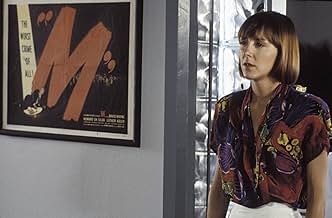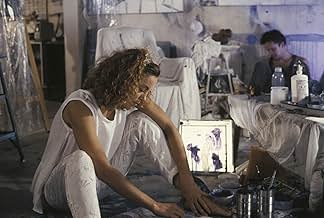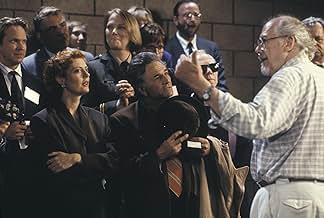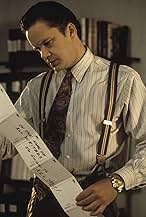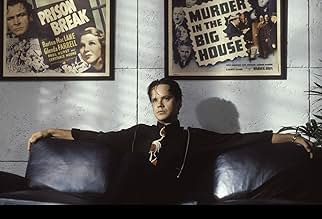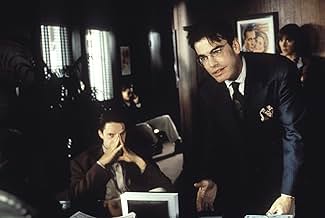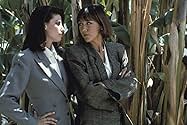The Player
- 1992
- Tous publics
- 2h 4min
Un cadre d'un studio hollywoodien reçoit des menaces de mort d'un écrivain dont il a rejeté le scénario, mais lequel ?Un cadre d'un studio hollywoodien reçoit des menaces de mort d'un écrivain dont il a rejeté le scénario, mais lequel ?Un cadre d'un studio hollywoodien reçoit des menaces de mort d'un écrivain dont il a rejeté le scénario, mais lequel ?
- Nommé pour 3 Oscars
- 24 victoires et 33 nominations au total
Avis à la une
"The Player" is bigger than the sum total of it's ingredients, because this Robert Altman classic has got so many links pointing to movie history that it is dizzying. It is all about Hollywood and the ins and outs of the movie industry. But let me first focus on the story for now, for those who just wanna see a suspenseful who dunnit story.
"The Player" is a slowburning, yet suspenseful detective story, with funny breathers scattered throughout. Whoopi Goldberg swinging her tampon is one of those hilarious scenes that lights up the seriousness of this detective story about the death threats. It's a who dunnit, with some jokes and with lots of parodies on the inside world of Hollywood. Lots and I really mean lots and lots of actors play themselves in this movie. Everybody wanted to be part of this movie that could be described as "a chainsaw cutting down Hollywood's image"
What's the story about? Tim Robbins plays a hollywood producer elbowing his way to the top. This selfish movie producer will do anything to gain more succes in the superficial world of Hollywood and he is hated by many writers and actors, who were ridiculed or rejected by him. This obnoxious movie producer starts getting death threats mailed to him by postcards. The death threats get more serious every week and Tim Robbins gets desperate to find out which psychotic writer is sending these threats.
"The Player" at first depicts the search for this mysterious person who is sending these evil death threats, but later on the movie takes a dramatic turn which I wont reveal here to avoid spoilers. As I said before, it is a slowburning story, yet slowly climaxing into a very suspenseful ending. Over 2 hours long. But I enjoyed every minute of it and I must have seen it over 10 times by now.
Acting is not particularly great, yet rather funny, in a more amusing satirical way. It is especially funny to see all those well known actors (in the nineties) walk by in this movie playing themselves. That is just eye candy. Julia Roberts, Bruce Willis among others in cameo roles, hilarous stuff!
This direction by Robert Altman is to be highly complimented for many things. Movie geeks would have a field day analyzing this satire on Hollywood. Read all the other reviews, people just have a field day here on imdb analyzing this Hollywood satire. Director Robert Altman made a very suspenseful yet funny detective story that has stood the test of time. More than 20 years later this movie is still a thrill and joy to watch...
"The Player" is a slowburning, yet suspenseful detective story, with funny breathers scattered throughout. Whoopi Goldberg swinging her tampon is one of those hilarious scenes that lights up the seriousness of this detective story about the death threats. It's a who dunnit, with some jokes and with lots of parodies on the inside world of Hollywood. Lots and I really mean lots and lots of actors play themselves in this movie. Everybody wanted to be part of this movie that could be described as "a chainsaw cutting down Hollywood's image"
What's the story about? Tim Robbins plays a hollywood producer elbowing his way to the top. This selfish movie producer will do anything to gain more succes in the superficial world of Hollywood and he is hated by many writers and actors, who were ridiculed or rejected by him. This obnoxious movie producer starts getting death threats mailed to him by postcards. The death threats get more serious every week and Tim Robbins gets desperate to find out which psychotic writer is sending these threats.
"The Player" at first depicts the search for this mysterious person who is sending these evil death threats, but later on the movie takes a dramatic turn which I wont reveal here to avoid spoilers. As I said before, it is a slowburning story, yet slowly climaxing into a very suspenseful ending. Over 2 hours long. But I enjoyed every minute of it and I must have seen it over 10 times by now.
Acting is not particularly great, yet rather funny, in a more amusing satirical way. It is especially funny to see all those well known actors (in the nineties) walk by in this movie playing themselves. That is just eye candy. Julia Roberts, Bruce Willis among others in cameo roles, hilarous stuff!
This direction by Robert Altman is to be highly complimented for many things. Movie geeks would have a field day analyzing this satire on Hollywood. Read all the other reviews, people just have a field day here on imdb analyzing this Hollywood satire. Director Robert Altman made a very suspenseful yet funny detective story that has stood the test of time. More than 20 years later this movie is still a thrill and joy to watch...
For anyone who loves movies, "The Player" is a treat.
To start, the screenplay is first-rate. The plot that holds the entire film together is superbly crafted; very few films leave you guessing right to the end as this one does. The finer details also shine through, such as the sales pitch scenes, which are inarguably classic (i.e. "The Graduate II").
I loved the attention to detail in "The Player". One can find a new detail every time one watches the film. For example, the opening sequence is a very long, continuous shot during which characters are discussing Hitchcock's "Rope", which appears to be a movie filmed all in one continuous shot. The sheer number of cameos in "The Player" makes it difficult to list all of them, so I won't even try.
"The Player" is one film that sets out to skewer Hollywood and actually succeeds. One only has to view the Bruce Willis/Julia Roberts sequence in order to understand this. My hat goes off to Robert Altman for making another excellent film.
To start, the screenplay is first-rate. The plot that holds the entire film together is superbly crafted; very few films leave you guessing right to the end as this one does. The finer details also shine through, such as the sales pitch scenes, which are inarguably classic (i.e. "The Graduate II").
I loved the attention to detail in "The Player". One can find a new detail every time one watches the film. For example, the opening sequence is a very long, continuous shot during which characters are discussing Hitchcock's "Rope", which appears to be a movie filmed all in one continuous shot. The sheer number of cameos in "The Player" makes it difficult to list all of them, so I won't even try.
"The Player" is one film that sets out to skewer Hollywood and actually succeeds. One only has to view the Bruce Willis/Julia Roberts sequence in order to understand this. My hat goes off to Robert Altman for making another excellent film.
"Players only love you when they're playing." --Stevie Nicks
Griffin Mill, whose name has a kind of ersatz Hollywood feel to it (cf., D. W. Griffith/Cecil B. De Mille), is not a player with hearts so much as a player with dreams. He is a young and powerful film exec who hears thousands of movie pitches a year, but can only buy twelve. So he must do a lot of dissembling, not to mention outright lying, along with saying "We'll get back to you," etc. This is what he especially must say to writers. And sometimes they hold a grudge. In this case one of the rejected writers begins to stalk Griffin Mill and send him threatening postcards. And so the plot begins.
Tim Robbins, in a creative tour de force, plays Griffin Mill with such a delightful, ironic charm that we cannot help but identify with him even as he violates several layers of human trust. The script by Michael Tolkin smoothly combines the best elements of a thriller with a kind of Terry Southern satirical intent that keeps us totally engrossed throughout. The direction by Robert Altman is full of inside Hollywood jokes and remembrances, including cameos by dozens of Hollywood stars, some of whom get to say nasty things about producers. The scenes are well-planned and then infused with witty asides. The tampon scene at police headquarters with Whoopi Goldberg is an hilarious case in point, while the sequence of scenes from Greta Scacchi's character's house to the manslaughter scene outside the Pasadena Rialto, is wonderfully conceived and nicely cut. Also memorable is the all black and white dress dinner scene in which Cher is the only person in red, a kind of mean or silly joke, depending on your perspective. During the same scene Mill gives a little speech in which he avers that "movies are art," a statement that amounts to sardonic irony since, as a greedy producer, he cares nothing at all about art, but only about box office success. His words also form a kind of dramatic irony when one realizes that this movie itself really is a work of art. As Altman observes in a trailing clip, the movie "becomes itself." The Machiavellian ending illustrates this with an almost miraculous dovetailing. This is the kind of script that turns most screen writers Kermit-green with envy.
Incidentally, Joe Gillis, the Hollywood writer played by William Holden in Sunset Boulevard--personifying all unsuccessful screen writers--actually does call during the movie, but Mill doesn't recognize the name and has to be told he is being put on, further revealing the narrow confines of his character.
In short, this is a wonderfully clever, diabolically cynical satire of Hollywood and the movie industry. This is one of those movies that, if you care anything at all about film, you must see. Period. It is especially delicious if you hate Hollywood. It is also one of the best movies ever made about Hollywood, to be ranked up there with A Star is Born (1937) (Janet Gaynor, Fredric March); Sunset Boulevard (1950); A Star is Born (1954) (Judy Garland, James Mason); and Postcards from the Edge (1990).
I must add that in the annals of film, this has to go down as one of the best Hollywood movies not to win a single Academy Award, although it was nominated for three: Best Director, Best Adapted Screenplay and Best Editing. I suspect the Academy felt that the satire hit a little too close to home for comfort.
(Note: Over 500 of my movie reviews are now available in my book "Cut to the Chaise Lounge or I Can't Believe I Swallowed the Remote!" Get it at Amazon!)
Griffin Mill, whose name has a kind of ersatz Hollywood feel to it (cf., D. W. Griffith/Cecil B. De Mille), is not a player with hearts so much as a player with dreams. He is a young and powerful film exec who hears thousands of movie pitches a year, but can only buy twelve. So he must do a lot of dissembling, not to mention outright lying, along with saying "We'll get back to you," etc. This is what he especially must say to writers. And sometimes they hold a grudge. In this case one of the rejected writers begins to stalk Griffin Mill and send him threatening postcards. And so the plot begins.
Tim Robbins, in a creative tour de force, plays Griffin Mill with such a delightful, ironic charm that we cannot help but identify with him even as he violates several layers of human trust. The script by Michael Tolkin smoothly combines the best elements of a thriller with a kind of Terry Southern satirical intent that keeps us totally engrossed throughout. The direction by Robert Altman is full of inside Hollywood jokes and remembrances, including cameos by dozens of Hollywood stars, some of whom get to say nasty things about producers. The scenes are well-planned and then infused with witty asides. The tampon scene at police headquarters with Whoopi Goldberg is an hilarious case in point, while the sequence of scenes from Greta Scacchi's character's house to the manslaughter scene outside the Pasadena Rialto, is wonderfully conceived and nicely cut. Also memorable is the all black and white dress dinner scene in which Cher is the only person in red, a kind of mean or silly joke, depending on your perspective. During the same scene Mill gives a little speech in which he avers that "movies are art," a statement that amounts to sardonic irony since, as a greedy producer, he cares nothing at all about art, but only about box office success. His words also form a kind of dramatic irony when one realizes that this movie itself really is a work of art. As Altman observes in a trailing clip, the movie "becomes itself." The Machiavellian ending illustrates this with an almost miraculous dovetailing. This is the kind of script that turns most screen writers Kermit-green with envy.
Incidentally, Joe Gillis, the Hollywood writer played by William Holden in Sunset Boulevard--personifying all unsuccessful screen writers--actually does call during the movie, but Mill doesn't recognize the name and has to be told he is being put on, further revealing the narrow confines of his character.
In short, this is a wonderfully clever, diabolically cynical satire of Hollywood and the movie industry. This is one of those movies that, if you care anything at all about film, you must see. Period. It is especially delicious if you hate Hollywood. It is also one of the best movies ever made about Hollywood, to be ranked up there with A Star is Born (1937) (Janet Gaynor, Fredric March); Sunset Boulevard (1950); A Star is Born (1954) (Judy Garland, James Mason); and Postcards from the Edge (1990).
I must add that in the annals of film, this has to go down as one of the best Hollywood movies not to win a single Academy Award, although it was nominated for three: Best Director, Best Adapted Screenplay and Best Editing. I suspect the Academy felt that the satire hit a little too close to home for comfort.
(Note: Over 500 of my movie reviews are now available in my book "Cut to the Chaise Lounge or I Can't Believe I Swallowed the Remote!" Get it at Amazon!)
Griffin Mill (Tim Robbins) is a studio executive who listens to about fifty thousand pitches for films a year, but can only green light twelve, and even then he doesn't get the final say on whether or not a movie gets made. So not being a nice guy to begin with, he figures he's probably made enemies of quite a few people who never got past the gate that he keeps. Then he starts getting threatening letters on his windshield, delivered at the studio, etc. From a writer angry that he said he'd call him about his idea and never did. Mill decides that the angry writer must be David Kahane, and so one night he goes to a movie theater where Kahane is watching "Bicycle Thieves", they talk, then they go get drinks at a restaurant, but then Kahane starts angrily mocking him on the way to their cars and Mill beats him to death in a fit of rage. Stunned at what he did, Mill tries to make it look like a robbery and then leaves.
But this is not a noir - Mill doesn't panic or lie. When the police question him he admits that he met Kahane, admits their relationship, admits everything except the murder. The police suspect him from the start but he doesn't let their harassment get to him. On top of that the harassing letters continue - he killed the wrong writer.
I thought this film was hilarious. It is just so other-worldly with people having very odd reactions, almost like a David Lynch film, so that at times I think Mill is just daydreaming. But, no, these people really did say or do these weird things. And then there are all of the celebrities who are sometimes playing themselves and sometimes are playing a character in the film. And if you want to know why Lyle Lovitt of all people is playing a cop here you have to see the hilarious final scene. Basically the moral of this movie is, in the words of "Crimes and Misdemeanors" - " if you want a happy ending, you should see a Hollywood movie."
But this is not a noir - Mill doesn't panic or lie. When the police question him he admits that he met Kahane, admits their relationship, admits everything except the murder. The police suspect him from the start but he doesn't let their harassment get to him. On top of that the harassing letters continue - he killed the wrong writer.
I thought this film was hilarious. It is just so other-worldly with people having very odd reactions, almost like a David Lynch film, so that at times I think Mill is just daydreaming. But, no, these people really did say or do these weird things. And then there are all of the celebrities who are sometimes playing themselves and sometimes are playing a character in the film. And if you want to know why Lyle Lovitt of all people is playing a cop here you have to see the hilarious final scene. Basically the moral of this movie is, in the words of "Crimes and Misdemeanors" - " if you want a happy ending, you should see a Hollywood movie."
Griffin Mill is a young hotshot producer who everyone bows and scrapes to because he has the powers to get a movie made. However he starts getting bugged by a dissatisfied writer which leads to all kinds of deadly intrigue.
Just when I thought Altman had gone totally off-the-boil he suddenly jumps back with his most perfectly realised film. While hardly unapplauded on its release (and in short retrospect) this is a movie that will be regarded by future generations as a classic. It is so smart, sassy, funny and has a beginning, a middle and an end. The kind of tragicomedy that gets the best of both worlds.
Robbins is perfect as the lead. He doesn't do much or emote much. As Robert De Niro once said "most people don't show their emotions, they hide them." Occasionally we get behind the shield of human indifference, but only occasionally. We don't like him much - nor should we - but he is not so bad that we can't bare him. Indeed he is merely someone whose selfish world gets out of control. Whoopie Goldberg makes the most of her unlikely casting too.
The appearance of stars in guest parts adds a bit of icing, but that is all. I loved Altman's directions to the stars who had to play walk-ons (who else could have got that?) "remember, you are responsible for who you are on screen. You are playing yourselves!"
The sexy Scacchi plays the love interest with great skill. While just a muse she is a far better actress than most and this shows in her short screen time. Shame she hasn't more involvement in the main plot.
Like breaking a car down in to its competent parts, taking The Player apart only leaves an ugly mess of oil and metal. Together it drives a tight little film that has insight, drama and comedy. I would hesitate to call this a masterpiece, but it is a mini-masterpiece that however farfetched never reaches the point of being totally unbelievable.
The pay off at the end is one of the best belly-laughs any film buff could ever get. I doubt I will see a better film about modern day Hollywood in my lifetime. Like Pulp Fiction, a film that is as enjoyable the second time of viewing as the first.
Just when I thought Altman had gone totally off-the-boil he suddenly jumps back with his most perfectly realised film. While hardly unapplauded on its release (and in short retrospect) this is a movie that will be regarded by future generations as a classic. It is so smart, sassy, funny and has a beginning, a middle and an end. The kind of tragicomedy that gets the best of both worlds.
Robbins is perfect as the lead. He doesn't do much or emote much. As Robert De Niro once said "most people don't show their emotions, they hide them." Occasionally we get behind the shield of human indifference, but only occasionally. We don't like him much - nor should we - but he is not so bad that we can't bare him. Indeed he is merely someone whose selfish world gets out of control. Whoopie Goldberg makes the most of her unlikely casting too.
The appearance of stars in guest parts adds a bit of icing, but that is all. I loved Altman's directions to the stars who had to play walk-ons (who else could have got that?) "remember, you are responsible for who you are on screen. You are playing yourselves!"
The sexy Scacchi plays the love interest with great skill. While just a muse she is a far better actress than most and this shows in her short screen time. Shame she hasn't more involvement in the main plot.
Like breaking a car down in to its competent parts, taking The Player apart only leaves an ugly mess of oil and metal. Together it drives a tight little film that has insight, drama and comedy. I would hesitate to call this a masterpiece, but it is a mini-masterpiece that however farfetched never reaches the point of being totally unbelievable.
The pay off at the end is one of the best belly-laughs any film buff could ever get. I doubt I will see a better film about modern day Hollywood in my lifetime. Like Pulp Fiction, a film that is as enjoyable the second time of viewing as the first.
Le saviez-vous
- AnecdotesThe celebrity cameos were not written in the script. Robert Altman added them all in. No scripted dialogue was given to any celebrity with a cameo.
- GaffesWhen Mill reads the newspaper story about the murder, a closeup of article reveals that it is just the same few paragraphs printed over and over.
- Citations
Griffin Mill: It lacked certain elements that we need to market a film successfully.
June: What elements?
Griffin Mill: Suspense, laughter, violence. Hope, heart, nudity, sex. Happy endings. Mainly happy endings.
June: What about reality?
- Crédits fousTim Robbins, Fred Ward and Cynthia Stevenson all enter the film when their names appear in the opening credits.
- Versions alternativesIn the theatrical version there was a frontal nude scene of Tim Robbins at the hotel in the desert. This scene was removed for the cable version.
Meilleurs choix
Connectez-vous pour évaluer et suivre la liste de favoris afin de recevoir des recommandations personnalisées
- How long is The Player?Alimenté par Alexa
Détails
- Date de sortie
- Pays d’origine
- Langue
- Aussi connu sous le nom de
- El ejecutivo
- Lieux de tournage
- 1921 Westholme Ave, Los Angeles, Californie, États-Unis(June Gudmundsdottir's house)
- Sociétés de production
- Voir plus de crédits d'entreprise sur IMDbPro
Box-office
- Budget
- 8 000 000 $US (estimé)
- Montant brut aux États-Unis et au Canada
- 21 706 101 $US
- Week-end de sortie aux États-Unis et au Canada
- 302 216 $US
- 12 avr. 1992
- Montant brut mondial
- 21 706 547 $US
- Durée
- 2h 4min(124 min)
- Couleur
- Mixage
- Rapport de forme
- 1.85 : 1
Contribuer à cette page
Suggérer une modification ou ajouter du contenu manquant



